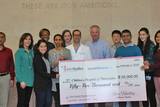

The Fore Hadley Foundation presented Children’s Hospital of Philadelphia (CHOP) with a grant totaling $55,000 to support congenital diaphragmatic hernia (CDH) research. The grant will support the research of Ian Krantz, MD, Director of the Roberts Individualized Medical Genetics Center, and William Peranteau, MD, a pediatric and fetal surgeon.
CDH occurs when the diaphragm muscle — the muscle that separates the chest from the abdomen — fails to close during prenatal development, and the contents from the abdomen (stomach, intestines and/or liver) migrate into the chest through this hole.
About 1,600 babies are born with CDH every year in the U.S., or 1 in every 2,500 live births — similar to the annual number of babies born with cystic fibrosis or spina bifida. At CHOP, nearly 50 babies are treated every year with CDH — more than any hospital in the U.S. Families with a prenatal CDH diagnosis are referred to our Center for Fetal Diagnosis and Treatment, where the staff conducts a comprehensive multidisciplinary evaluation.
Drs. Peranteau and Krantz and their teams have a long history of clinical and basic science expertise in managing and investigating the causes of CDH. They have unparalleled access to a large well-characterized CDH patient cohort with the ability to collect unique tissue samples to ask innovative questions about the molecular origins of CDH. With this funding from the Fore Hadley Foundation, Dr. Krantz and his team will harness new genomic technologies, which will allow for unprecedented advances in understanding the condition’s genetic causes.
“We thank the Fore Hadley Foundation for its generous donation and support of CDH research. Philanthropic gifts are critical to the groundbreaking research conducted at CHOP, including CDH research,” said Dr. Peranteau. “With this type of support, we are one step closer in identifying the genetic causes of CDH and finding answers for affected families.”
“There are many complex issues intertwined in identifying the underlying genetic cause of CDH for affected families,” added Dr. Krantz. “Finding a genetic answer will allow for better prognostic information for families, accurate recurrence risk counseling for future pregnancies, and potential identification and future development of therapeutic approaches.”
Featured in this article
Specialties & Programs

The Fore Hadley Foundation presented Children’s Hospital of Philadelphia (CHOP) with a grant totaling $55,000 to support congenital diaphragmatic hernia (CDH) research. The grant will support the research of Ian Krantz, MD, Director of the Roberts Individualized Medical Genetics Center, and William Peranteau, MD, a pediatric and fetal surgeon.
CDH occurs when the diaphragm muscle — the muscle that separates the chest from the abdomen — fails to close during prenatal development, and the contents from the abdomen (stomach, intestines and/or liver) migrate into the chest through this hole.
About 1,600 babies are born with CDH every year in the U.S., or 1 in every 2,500 live births — similar to the annual number of babies born with cystic fibrosis or spina bifida. At CHOP, nearly 50 babies are treated every year with CDH — more than any hospital in the U.S. Families with a prenatal CDH diagnosis are referred to our Center for Fetal Diagnosis and Treatment, where the staff conducts a comprehensive multidisciplinary evaluation.
Drs. Peranteau and Krantz and their teams have a long history of clinical and basic science expertise in managing and investigating the causes of CDH. They have unparalleled access to a large well-characterized CDH patient cohort with the ability to collect unique tissue samples to ask innovative questions about the molecular origins of CDH. With this funding from the Fore Hadley Foundation, Dr. Krantz and his team will harness new genomic technologies, which will allow for unprecedented advances in understanding the condition’s genetic causes.
“We thank the Fore Hadley Foundation for its generous donation and support of CDH research. Philanthropic gifts are critical to the groundbreaking research conducted at CHOP, including CDH research,” said Dr. Peranteau. “With this type of support, we are one step closer in identifying the genetic causes of CDH and finding answers for affected families.”
“There are many complex issues intertwined in identifying the underlying genetic cause of CDH for affected families,” added Dr. Krantz. “Finding a genetic answer will allow for better prognostic information for families, accurate recurrence risk counseling for future pregnancies, and potential identification and future development of therapeutic approaches.”
Contact us
Jennifer Lee
Richard D. Wood Jr. Center for Fetal Diagnosis and Treatment